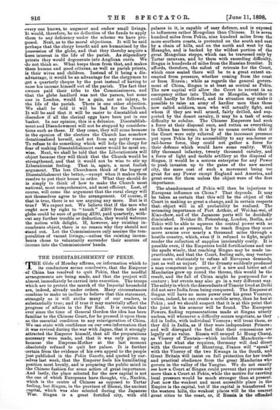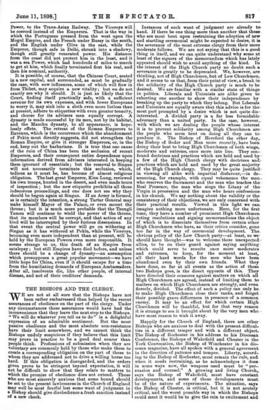THE DISESTABLISHMENT OF PEKIN.
'THE Globe of Monday affirms, on information which to its conductors seems conclusive, that the Emperor • ef China has resolved to quit Pekin, that the needful arrangements are being made, and that the project will almost immediately be carried into execution. The troops which are to protect the march of the Imperial household are, indeed, already under orders. Many circumstances .combine to make us incline to believe that this statement, -strangely as it will strike many of our readers, is substantially true; and if true it may materially affect the progress of affairs in the Far East. It is certain that ever since the time of General Gordon the idea has been familiar to the Chinese Court, for he pressed it upon them as the essential condition to any reinvigoration of China. We can state with confidence on our own information that it was revived during the war with Japan, that it strongly attracted the Emperor himself, that all the preparations tnecessary were made, and that it was only given up because the Empress-Mother at the last moment absolutely refused to quit her palace. It is further .certain from the evidence of his own appeal to the people just published in the Pekin Gazette, and quoted by our- -selves last week, that the Emperor feels his humiliating position most keenly, and is preparing the public mind in the Chinese fashion for some action of great importance. And lastly, the place selected for the new capital is not the one of which Europeans have thought, viz., Nankin, -which is the centre of Chinese as opposed to Tartar feeling, but Singau, in the province of Shensi, the ancient ,capital, which was also selected during the Japanese War. Slogan is a great fortified city, with old palaces in it, is capable of easy defence, and is exposed to influences rather Mongolian than Chinese. It is seven hundred miles from Pekin, nine hundred miles from the more southern coasts, is protected on the south and east by a chain of hills, and on the north and west by the Hoangho, and is backed by the wildest portion of the great Mongolian steppe, which can be traversed only by Tartar caravans, and by them with exceeding difficulty. Singan is hundreds of miles from the Russian frontier. It affords, therefore, the safest of retreats for the Court, which once seated there will be to a great extent ex- empted from pressure, whether coming from the coast or from Russia ; while as regards the general govern- ment of China, Singan is at least as central as Pekin. The new capital will allow the Court to retreat in an emergency either into Thibet or Mongolia, whither it could hardly be followed, and its situation may make it possible to raise an army of hardier men than those now called soldiers, men who will actually fight, and whom if they are well armed, fairly drilled, and sup- ported by the desert cavalry, it may be a task of some difficulty to subdue. The Chinese Emperors had such a force at their disposal once, and rotten as everything in China has become, it is by no means certain that if the Court were only relieved of the incessant pressure put upon Pekin by its accessibility to any sea-borne or rail-borne force, they could not gather a force for their defence which would have some reality. With fifty thousand infantry, twenty thousand cavalry, and a force of light and mobile artillery at the disposal of Singan, it would be a serious enterprise for any Power to push invasion up to the gates of the new sacred city, the mere cost of such a movement being too great for any Power except England and America, and great even for them unless the object were of the first importance.
The abandonment of Pekin will then be injurious to European influence on China ? That depends. It may be taken as certain that this will be the object of the Court in making so great a change, and in certain respects that' object will in all probability be realised. The menacing importance of Port Arthur, of Wei-hai-wei, of Kiao-chow, and of the Japanese ports will be decidedly diminished. Neither St. Petersburg, London, Berlin, nor Tokio will be able to squeeze the central power with as much ease as at present, for to reach Singa.n they must move armies over nearly a thousand miles through a hostile country, which, even if it refused to fight, might render the collection of supplies intolerably costly. It is possible even, if the Emperors build fortifications and use the spade wisely, that reaching Singan may be made im- practicable, and that the Court, feeling safe, may venture once more obstinately to refuse all European demands, just as well as unjust. If the dynasty suddenly produced a man competent to govern, or if a new and better set of Mandarins grew up round the throne, this would be the result, and the fall of China might be postponed for a century ; but events may also go in a very different way. The safety in which the descendants of Timour lived at Delhi did not save India from being conquered. The Emperor at Singan will have no more power over his great Viceroys, unless, indeed, he can create a mobile army, than he has at Pekin ; and we should suspect that it is at this point that the joint in his armour will be found. The European Powers, finding representations made at Singan utterly useless, will whenever a difficulty occurs negotiate, as they did in India, with individual Viceroys; will treat them, as they did in India, as if they were independent Princes ; and will disregard the fact that their concessions are legally of no value. Russia will compel Li Hung Chang, as Viceroy of Tientsin—which includes Manchuria—to grant her what she requires, Germany will deal direct with the Governor of Shantung, France will " speak " with the Viceroy of the two Kwangs in the South, and Great Britain will insist on full protection for her trade and practical obedience from the great Mandarins who govern in the valley of the Yangtse. We do not exactly see how a Court at Singan could prevent that process any more than a Court at Pekin, while the motive for exerting local pressure would be much stronger than at present. Just now the weakest and most accessible place in the Empire is the capital, but if the capital is transferred to the western hills, the weakest places will be the nearest great cities to the coast, or, if Russia is the offended Power, to the Trans-Asian Railway. The Viceroys will be coerced instead of the Emperors. That is the way in which the Portuguese pressed from the west upon the Mogul Empire, and the French under Bussy in the south, and the English under Clive in the east, while the Emperor, though safe in Delhi, shrunk into a shadowy, though still greatly venerated power. His distance from the coast did not protect him in the least, and it was a sea Power, which had hundreds of miles to march to get at him, which finally terminated first his real, and then his nominal, authority.
It is possible, of course, that the Chinese Court, seated in a new capital, and surrounded, as must be gradually the case, with new influences, some of which will flow in from Thibet, may acquire a new vitality; but we do not exactly see why it should. It is just as likely that the Court, finding itself practically safe, with a sufficient revenue for its own expenses, and with fewer Europeans to worry it, may sink into a sloth even more listless than at present, adhere to etiquettes with even greater tenacity, and choose for its advisers men equally corrupt. A dynasty is made successful by its men, not by its habitat, and the Manchu dynasty, to all appearance, is hope- lessly effete. The retreat of the Roman Emperors to Ravenna, which is the occurrence which the abandonment of Pekin most directly suggests, did not strengthen the Roman Empire, or give it stronger Emperors, or, in the end, keep out the barbarians. It is true that one cause of the ruin of China has been the seclusion of recent Emperors, and their consequent entire dependence upon information derived from advisers interested in keeping them ignorant of essentials ; but the removal to Singan will not necessarily terminate this seclusion, which, tedious as it must be, has become of almost religious obligation. The last great Emperor, Kien Lung, reviewed his own troops, hunted in the desert, and even made tours of inspection ; but the new etiquette prohibits all those indecorous proceedings, and one does not see why they should be begun again at Singan. If an Army is formed, as is certainly the intention, a strong Tartar General may make himself Mayor of the Palace, or even mount the throne; but it is much more probable that the Tsungli Yamen will continue to wield the power of the throne, that its members will be corrupt, and that action of any kind will be interrupted by their furious dissensions. In that event the central power will go on withering at Singan as it has withered at Pekin, while the Viceroys, becoming even more independent than at present, will be held by the European Powers even more responsible. It seems strange to us, this death of an Empire from catalepsy ; but still Empires have died before, and unless there should be a change of dynasty—an assumption which presupposes a great popular movement—we have little hope for China, even if it should escape for a time from the humiliating demands of European Ambassadors. After all, insolvents die, like other people, of internal disease, and not of their creditors' demands.







































 Previous page
Previous page